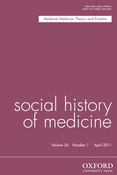-
Views
-
Cite
Cite
Guido Giglioni, Federico Schneider, Pastoral Drama and Healing in Early Modern Italy, Social History of Medicine, Volume 24, Issue 1, April 2011, Pages 198–199, https://doi.org/10.1093/shm/hkr030
Close - Share Icon Share
Extract
According to a traditional literary motif, Arcadia is the place where heartbroken lovers find solace from their pain. The use of literature to heal the scars of amorous melancholy is at the centre of Federico Schneider's study on the aesthetic and cultural implications of pastoral drama in Torquato Tasso's Aminta (1580) and Battista Guarini's Il pastor fido (1589). The author argues that renewed interest in Aristotle's Poetics during the Italian Renaissance and, more specifically, the ensuing debate concerning the medicinal virtue of catharsis created the ideal conditions for the emergence of a novel idea of pastoral therapy, more suited to the political and social circumstances of post-Tridentine Italian courts. Embedded in a lyrical atmosphere where sorrow and pleasure are intertwined, Aminta and Pastor fido represent for Schneider the perfect embodiment of the principles of tragicomic aesthetics. Since the representation of both irredeemably tragic misfortunes and outbursts of coarse laughter could not suit the canons of courtly decorum, tragicomic drama in a pastoral setting provided the opportunity to show how reason was able to sublimate unruly passions and build virtuous habits out of their affective energy. In Schneider's opinion, three important factors converged to define late Renaissance pastoral therapy: the effort to find a successful cure for bouts of lovesick melancholy; the process of gradual intellectualisation of aesthetic pleasure fostered by sixteenth-century interpretations of Aristotelian poetics; and finally, the notion of tragicomic drama as an antidote against the corrupting effects of sensual love and mimesis in general.




